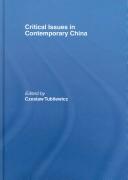| Listing 1 - 4 of 4 |
Sort by
|

ISBN: 0415395844 0415395852 9780415395847 9780415395854 Year: 2006 Publisher: New York Routledge
Abstract | Keywords | Export | Availability | Bookmark
 Loading...
Loading...Choose an application
- Reference Manager
- EndNote
- RefWorks (Direct export to RefWorks)
'Critical Issues in Contemporary China 'offers up-to-date and in-depth coverage of the social, political and economic problems facing contemporary China. It provides students with a comprehensive analysis of a number of key issues including: Critical developments in Chinese politics The privatization of China's economy and social services Regional economic inequalities Environmental problems Population growth and food security Ethnic minorities Social change Social and economic inequalities Cross-strait relations with Taiwan By examining the three interrelated themes of stability, sustainable development and territorial integrity, the contributors raise important questions regarding the Chinese Communist Party's capacity to continue fast paced economic development and maintain the territorial unity of 'China. Critical Issues in Contemporary China' is both accessible and informative with a number of useful pedagogical features that will equip undergraduates with the analytical skills needed to assess the political, economic and social challenges surrounding China as it enters the twenty-first century.''
China --- Economic conditions --- Politics and government --- Social conditions --- S02/0154 --- S06/0223 --- S10/0251 --- S11/0497 --- S11/1215 --- S20/0315 --- S20/0500 --- China: General works--China (and Asia): since 1989 --- China: Politics and government--People's Republic: general: since 1976 --- China: Economics, industry and commerce--General works and economic history: since 1989 --- China: Social sciences--Society since 1976 --- China: Social sciences--Works on national minorities and special groups: since 1949 --- China: Agriculture forestry, fishery, natural disasters--Rice and wheat: after 1949 --- China: Agriculture forestry, fishery, natural disasters--Environmental policy, pollution

ISBN: 9780415422529 Year: 2007 Publisher: London Routledge
Abstract | Keywords | Export | Availability | Bookmark
 Loading...
Loading...Choose an application
- Reference Manager
- EndNote
- RefWorks (Direct export to RefWorks)
Book
ISBN: 9780367354923 0367354926 Year: 2020 Publisher: Abingdon Routledge
Abstract | Keywords | Export | Availability | Bookmark
 Loading...
Loading...Choose an application
- Reference Manager
- EndNote
- RefWorks (Direct export to RefWorks)
"This book analyses Chinese social constructions of sovereignty in the context of the East China Sea conflict. It specifically explores China and Taiwan's overlapping cross-Strait sovereignty claims and their domestic debates and policies towards the territorial dispute. Providing an up-to-date discussion of the East China Sea conflict, the book challenges conventional assumptions regarding both Beijing's and Taipei's adherence to the classical notion of Westphalian sovereignty. Instead, it brings China and Taiwan into the Constructivist analytical framework and develops a domestic agency-focused approach to demonstrate the social power of ideas and the centrality of domestic actors in the production of sovereignty. Offering a comprehensive examination of Chinese, Taiwanese, Japanese and US responses at the domestic and international levels, the book studies the existing sovereignty narratives and the coordination of efforts made by the PRC and ROC authorities to counter Japan's territorial claims in the East China Sea. Featuring extensive analysis of the conceptual approaches to understanding Chinese sovereignty, Chinese Constructions of Sovereignty and the East China Sea Conflict will be useful for students and scholars of Chinese and Asian politics, as well as international relations and security studies"--
Territorial waters --- East China Sea --- China --- Taiwan --- Japan --- International status. --- Foreign relations
Book
ISBN: 9780367763190 Year: 2021 Publisher: Abingdon, Oxon ; New York, NY : Routledge,
Abstract | Keywords | Export | Availability | Bookmark
 Loading...
Loading...Choose an application
- Reference Manager
- EndNote
- RefWorks (Direct export to RefWorks)
This book examines US subnational engagement in foreign relations, or paradiplomacy, with China and Taiwan from 1949 to 2020. As an alternative diplomatic history of the United States’ relations with divided China, it offers an in-depth chronological and thematic discussion of state and local communities’ responses to the China-Taiwan sovereignty conflict and their impact on US diplomacy.The book explains why paradiplomacy matters not only in the ‘low politics’ of economic and cultural cooperation, but also in the ‘high politics’ of diplomatic recognition. Presenting case studies of US states and cities developing policies towards divided China that paralleled, clashed or aligned with those pursued by federal agencies, it also identifies Chinese and Taiwanese objectives and strategies deployed when competing for US subnational ties. Conceptually, the book builds upon Constructivism, redefining paradiplomacy as an institutional fact, reflective of subnational identities and interests, rather than as a subnational pursuit of foreign markets, driven by objective economic forces.Featuring new empirical evidence and a novel conceptual framework for paradiplomacy, The United States’ Subnational Relations with Divided China will be a useful resource for students and scholars of US foreign policy, the politics of China and Taiwan, paradiplomacy and international relations.
State governments and international relations --- Subnational governments --- Foreign relations --- United States --- China --- United States --- Taiwan --- Foreign relations --- Foreign relations --- Foreign relations --- Foreign relations
| Listing 1 - 4 of 4 |
Sort by
|

 Search
Search Feedback
Feedback About UniCat
About UniCat  Help
Help News
News